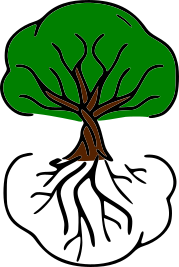Last fall I was fortunate enough to visit the Association of Science and Technology Centers conference in Hartford, CT. While walking with some coworkers to dinner we found a beautiful owl stunned and walking on the road.
We did our best to guide it off of the road where it could rest on the sidewalk. Some local police officers came and told us they would make sure this owl got back “to where it belonged.”
I had been in this city less than 24 hours, but was I more ‘native’ to this cityscape than this owl? When does one become native? Can you lose that title?
Becoming Native
When I think about native species, I often don’t think “When did this species first arrive in this place?” I would assume, generally, that the organism that I see is a direct decedent of an organism that was here before. But taking a huge step back, one hypothesis about life forming is that it all originates from the ocean. Does that make all life on land alien?
Of course not. Over millions and millions of years organisms started to transition slowly to land, and some transitioned back. So in the extremely long term, this question doesn’t apply.
But what if the species isn’t evolving over millions of years, but thousands? Looking at the question from a scientific point of view, Carthey and Banks asked;
“As a result, one critical question remains unanswered: at what point after establishment and naturalization is an alien species sufficiently integrated into its new ecosystem to be considered native?”
To answer this they looked at how bandicoots, small rodents found in Australia, respond to both cats and dogs. The theory is dingos, a type of dog, were introduced to the continent of Australia 4,000 years ago. Since dogs (both house pets and dingos) generally hunt the same way, bandicoots should respond to them similarly. House cats do not have a similar wild species. Therefore, if bandicoots avoid house dogs as they do dingos, but not house cats, bandicoots have evolved to treat dingos as a part of the ecosystem and not foreign.
The results from When Does an Alien Become a Native Species? by Carthey and Banks found;
“The presence of dogs was associated with fewer signs of bandicoots...the presence of cats was not associated with any of these measures...”
Bandicoots were specifically avoiding dogs, since they had learned over generations to avoid dingos. They had not learned over generations to avoid cats. Therefore, dingos can be seen as native, even though they were introduced 4,000 years ago.
But what about hundreds? Can you be native to a place within a generation? Speaking from personal experience I would never identify as Native American, but I feel no deep connection to Europe where my ancestors immigrated from. Even though my family has been in these mountains for a few hundred years at most, this is where I feel most connected to.
Becoming Alien
The species of owl we found on CT has evolved over thousands of years to live in the cold forests of North America. Within a blink of an eye (geologically), that landscape has changed to be loud, bright, and filled with people. All of its adaptations didn’t prepare it for such an extreme change. Is it now an alien? I don’t think yet, but it might be.
As much as we have changed our ecosystems New England isn’t completely paved over. There are still trees and streams for the owl to return to. But what if we pave over our planet, like was done on Coruscant?
Coruscant, from Wookipedia
When we as a species grow, adapt, and evolve across the stars, we must always progress with all of the organisms native to Earth, and take them with us as we become alien.



